Glycogenesis & Glycogen Regulation
MCAT Biochemistry Chapter 5 - Section 2.2 - Metabolic Pathways - Glycogenesis & Glycogen Regulation
- Home
- »
- MCAT Masterclass
- »
- Biological and Biochemical Foundations of Living Systems
- »
- Biochemistry
- »
- Glycogenesis & Glycogen Regulation – MCAT Biochemistry
Sample MCAT Question - Glycogenesis & Glycogen Regulation
Which hormone stimulates glycogenesis in the liver?
a) Gastrin
b) Insulin
c) Epinephrine
d) Glucagon
B is correct. Insulin.
Glycogen is primarily stored in the liver and skeletal muscle. The hormone insulin stimulates glycogenesis in both the liver and skeletal muscle. Insulin is released in response to high blood glucose concentrations, and it stimulates cells to increase glucose uptake. The increased glucose in the liver and skeletal muscle cells will undergo glycogenesis to create glycogen. Answer choice A is a hormone that promotes the secretion of HCl in the stomach in response to the presence of food. Answer choice C and D would both promote the opposite process, glycogenolysis.
Get 1-on-1 MCAT Tutoring From a Specialist
With MCAT tutoring from MedSchoolCoach, we are committed to help you prepare, excel, and optimize your ideal score on the MCAT exam.
For each student we work with, we learn about their learning style, content knowledge, and goals. We match them with the most suitable tutor and conduct online sessions that make them feel as if they are in the classroom. Each session is recorded, plus with access to whiteboard notes. We focus on high-yield topics if you’re pressed for time. If you have more time or high-score goals, we meticulously cover the entire MCAT syllabus.
Glycogenolysis vs Glycogenesis
Glycogen is a polymer of glucose that can be readily synthesized and broken down to release glucose for ATP production. Together glycogenesis and glycogenolysis comprise glycogen metabolism. Note how the two terms are similar and, therefore, easily confused. An easy way to differentiate the two is by the suffix “-lysis,” which means to dissolve or break apart, and “-genesis,” which means to create or develop. Glycogenolysis and glycogen’s branched structure were the subjects of a previous post on glycogen. This post, by contrast, will focus on glycogenesis and the regulation of glycogen-related metabolic pathways.
Steps of Glycogenesis
Like glycogenolysis, glycogenesis involves several steps. First, glucose 6-phosphate is converted to glucose 1-phosphate by the enzyme phosphoglucomutase. (Note that this is the same enzyme that catalyzes the conversion of glucose 1-phosphate to glucose 6-phosphate in glycogenolysis.) Next, glucose 1-phosphate reacts with UTP to produce UDP-glucose and pyrophosphate (Figure 1).
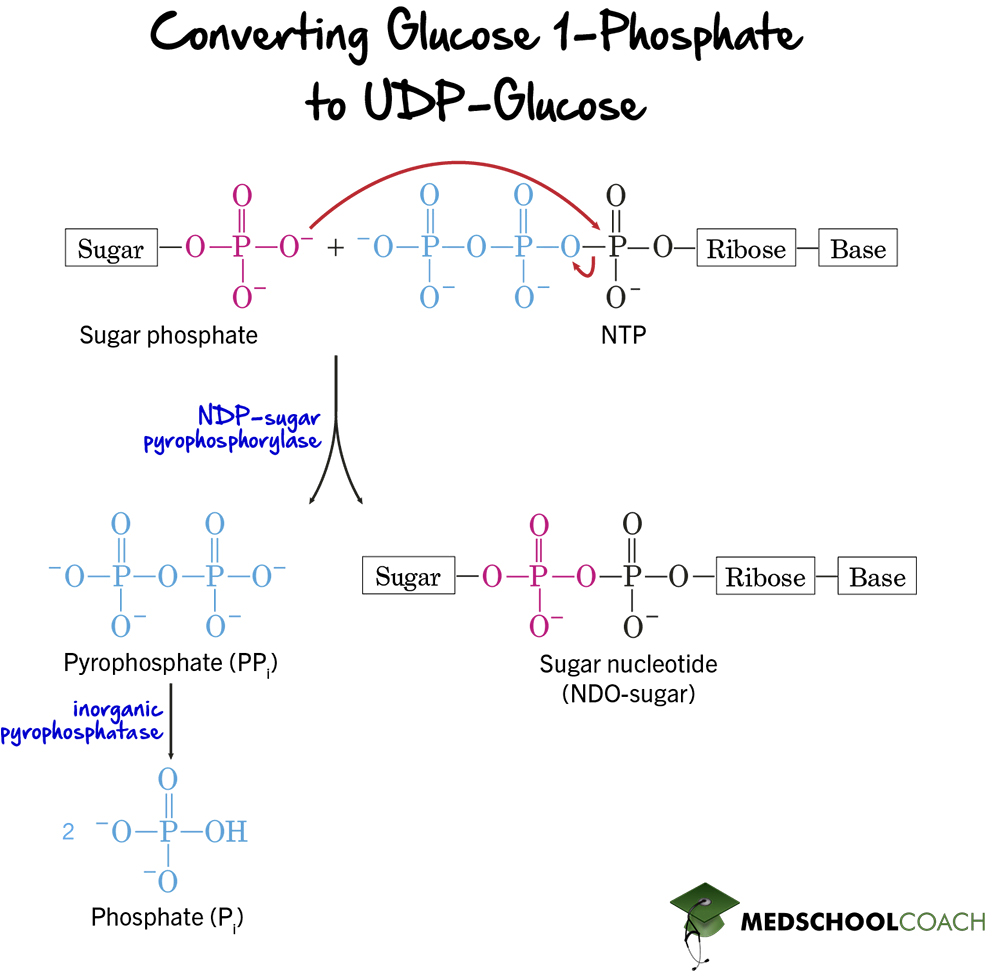
The pyrophosphate formed from this reaction is further broken down into two separate phosphate molecules to release even more energy in a reaction catalyzed by UDP-glucose pyrophosphorylase. Figure 2 illustrates how UDP glucose is used to extend the glycogen chain by adding new α-1,4 linkages. This reaction is catalyzed by glycogen synthase.
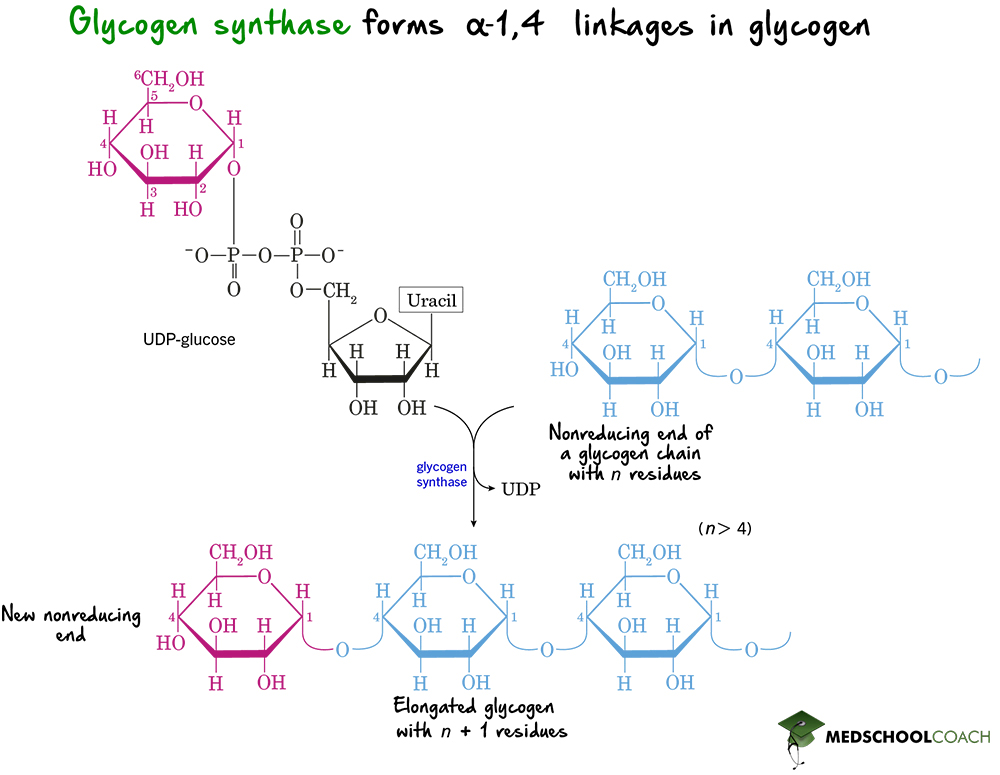
Lastly, glycogen branching enzyme will take chains of glucose monomers and form α-1,6 linkages to add more branches to glycogen (Figure 3).
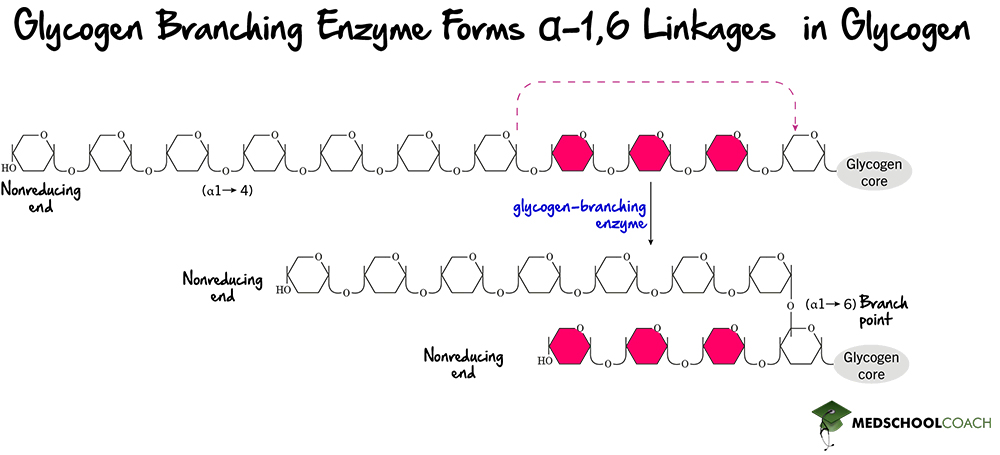
Regulation of Glycogen Metabolism
Recall that glycogen is primarily stored in the liver and skeletal muscle, with insulin stimulating glycogenesis in both cell types. This should make sense, since insulin is released in response to high blood glucose concentrations, stimulating cells to increase their glucose uptake. In this way, the presence of insulin is correlated with plentiful amounts of glucose in the liver and skeletal muscle cells that can be used to create glycogen. However, how glycogen storage is regulated differs between the two.
In the liver, glucagon stimulates glycogenolysis and inhibits gluconeogenesis and glycolysis. Up-regulated glycogenolysis will produce more glucose; however, by inhibiting glycolysis, the hepatocytes in the liver are prevented from using the glucose that is produced. In this way, since the liver is the primary reservoir of glucose in the body; the glucose produced in response to glucagon is released into the bloodstream for other tissues to use.
Skeletal muscle cells, on the other hand, use the glucose they produce for themselves. First, instead of responding to glucagon, they respond to epinephrine. Recall that epinephrine is released with the fight-or-flight response in the nervous system. Epinephrine stimulates glycogenolysis and glycolysis in skeletal muscle.
Explore More MCAT Masterclass Chapters
Take a closer look at our entire MCAT Masterclass or explore our Biochemistry lessons below.

One-on-One Tutoring
Are you ready to take your MCAT performance to a whole new level? Work with our 99th-percentile MCAT tutors to boost your score by 12 points or more!
See if MCAT Tutoring can help me
Talk to our enrollment team about MCAT Tutoring

MCAT Go Audio Course
Engaging audio learning to take your MCAT learning on the go, any time, any where. You'll be on the way to a higher MCAT score no matter where you are. Listen to over 200+ lessons.
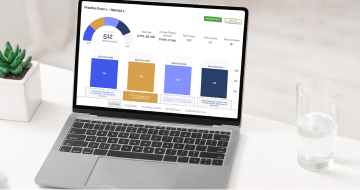
MCAT Practice Exams
Practice makes perfect! Our mock exams coupled with thorough explanations and in-depth analytics help students understand exactly where they stand.
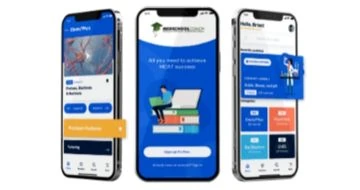
MCAT Prep App
Access hundreds of MCAT videos to help you study and raise your exam score. Augment your learning with expert-created flashcards and a question banks.
